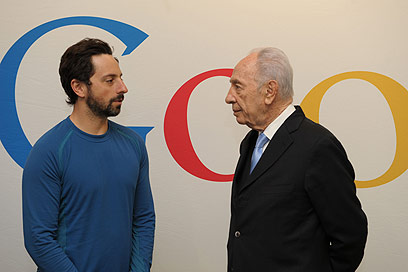
"Everyone wants to be an entrepreneur and set up his own start-up with three or four workers. This means that the existing start-ups and the big companies simply can't find enough high-level employees," a high-tech manager tells Mamon.
The Israeli high-tech market has grown in the past few years, and two processes have taken place as a result: on one hand, investment is streaming in and new start-ups are popping up everywhere. At the same time, more and more international firms are acquiring companies and establishing research and development (R&D) centers in Israel.
Related stories:
- Why is the market booming when industry is down?
- Gov't campaign urges employment of Arab academics
- Sweden loves Israeli high-tech
- Sweden loves Israeli high-tech
These two situations have created a growing need for engineers and computer scientists. Every company wants to hire the best, and workers are looking for the best salaries. Recently, companies – start-ups and big firms alike – have noted a drought of workers.
According to estimates, as many as 10,000 positions for software and hardware engineers are currently unfilled. Many companies are seeking "top-level" workers. For recruiters, this means people who served in the IDF's technological units and top university graduates. Of course, there aren't too many of these, and companies aren't managing to hire.

President Shimon Peres and Google founder Sergei Brinn. (Photo: Moshe Milner, GPO)
Udi Itzhayek, director of the information security company Imperva Israel, agrees that this is the case. Before joining Imperva, Itzhayek founded and ran a human resources outsourcing and consulting firm. He says that Imperva needs about 30 new workers.
"We feel strong competition for employees, and everyone wants the best. This is an employees' market, not an employers' market," Itzhayek says, adding that the new reality has lead to a steady increase in salaries over the past two years.
In addition to more attractive salaries, job candidates also enjoy much more freedom to choose and are in a position to make demands. An industry source told Mamon that in light of the demand, even candidates for quality assurance (QA) positions, without a degree or experience, can demand – and sometimes receive – salaries of NIS 16,000-17,000 a month.
"A candidate can tell you, 'I have an offer from a start-up in the music field, which is something I'm really interested in,'" Itzhayek explains. "That's what happens when there is plenty available. I can't offer him (music), but I can offer him stability and an interesting, challenging work environment."
Furthermore, Itzhayek notes, small high-tech companies are competing not only against start-ups, but also against giants like HP and Google. Apple is the latest hot job for high-tech employees. The company is building an R&D center in Haifa, and only last month it listed seven new engineering positions.
Little start-ups are also affected. "It's the number one problem for us," Roee Adler, VP of products at Soluto says. "Our standard is high – and we feel that the pool is small. We work with all the employment agencies there are, but we are a start-up, and we have limited means to compete with big companies' salaries and benefits. Our only weapon is growth and (the fact that) it's fun to work here," he says.
Yehuda Zisapel, chairman of the RAD-Bynet Group and a senior member of the high-tech sector in Israel, discussed the risks of the current situation in high-tech at the recent Bynet Expo conference.
"The Israeli high-tech market is frozen," he said. "Not enough has been invested in training engineers and scientists. For 20 years, high-tech grew by a factor of 4, but the number of scientists and engineers didn't increase proportionally."
According to Zisapel, high-tech growth is the reason why the European debt crisis hasn't hit Israel. "If we don't invest in training engineers, the crisis will hit us," he warned.















